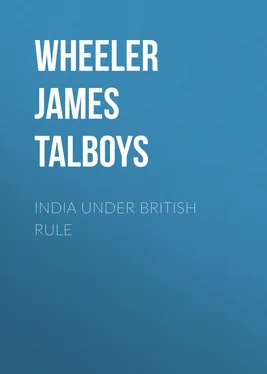Corporation festivities.
The new municipality was inaugurated with much pomp and ceremony in 1688, the year of the glorious Revolution. The Governor of Madras was outside the corporation, but the mayor and three senior aldermen were members of council. On Saturday, the 29th of September, 1688, the Governor received the mayor, aldermen, and burgesses in the council-chamber at Fort St. George. The members of the new corporation then took the oaths and sat down to a corporation dinner; and after a while they all marched to the town-hall in their several robes, with the maces before the mayor. Nothing, however, is said about the heads of castes, and nothing more about the burgesses.
Failure of municipal rule.
The mayor and aldermen were to be a Court of Record, with power to try all causes, criminal and civil, in a summary way, according to "equity and good conscience," and such laws and orders as might be made by the Company. The corporation were authorised to levy taxes for building a guild-hall, a public jail, and a school-house for teaching English, arithmetic, and merchants' accounts to Indian children, and for payment of the necessary salaries. Henceforth, two aldermen sat as justices of the Choultry; but the corporation raised no tax and founded no institution, and eventually died out from sheer want of vitality.
Slavery under Hindu rule.
§6. All this while the slave trade was an institution in Madras, and indeed, throughout Southern India. In most of the Hindu kingdoms of the Peninsula, the farm-labourers were slaves or serfs attached to the soil; they were probably aboriginal populations who had been reduced to slavery by their conquerors. Prisoners of war, male and female, were also compelled to serve the conquerors as domestic servants, and treated as slaves of the family.
Mohammedan slavery.
When Turks and Afghans introduced Mohammedan rule, slavery was recognised, but Hindu slaves might raise their condition by embracing Islam, and the converts might become important personages in the household, and marry female members of the family. The favourites of a grandee or Sultan might even marry a daughter, and rise to the rank of steward of the household or minister of state, like Joseph in the court of the Pharaohs.
Mogul restrictions.
When the Moguls established their dominion over Northern India there was a change for the better. It was a fundamental law of the Moguls that no subject should be enslaved, but only captives taken in war. This law was still enforced when the Moguls became Mohammedans, for they always looked upon the slavery of subjects with horror, whatever might be their race or religion. Foreign slaves, male and female, provided they were not Mohammedans, were sold by private dealers, or in the public bazaar. 4 4 This was notoriously the case at Surat, where female slaves might be purchased by Europeans. There was a Dutch factory at Surat of the same stamp as the British factory, and its married inmates were in like manner forbidden to bring their wives from Holland. But when the Dutch got possession of Java, they offered grants of land to married Dutchmen, and, according to Pietro della Valle, there was a sudden change in domestic arrangements. Dutch bachelors were in such a hurry to go to Java, that they married Armenian Christians, or went off to the bazaar and bought female slaves and baptised them and married them without loss of time.
Portuguese slave trade.
Unfortunately, the Portuguese and other nations of Europe had not as yet awakened to the iniquity of slavery and the slave trade. During the Portuguese wars in Africa, Moors and Negroes were carried off as prisoners of war and sold as slaves in Lisbon. In India the Portuguese established depôts for the purchase of slaves. At Goa female slaves were to be found in every Portuguese household, and sometimes were sent into the streets to sell sweetmeats and confectionary, and earn money for their masters in other ways.
Kidnapping from Bengal.
For many years large numbers of Hindu slaves were brought from Bengal. The Portuguese had been permitted to build a factory at Hughly, on the river Hughly, about 120 miles from the sea. During an interval of civil war they fortified this settlement and landed numerous cannon, whilst a native town grew up in the neighbourhood. Meanwhile, the scum of Goa and other Portuguese towns, chiefly military deserters and apostate monks, had established themselves on the islands near the mouths of the Ganges, built a fleet of galleys, and led the lives of pirates, brigands, and kidnappers. These men were the pest of the Sunderbunds. They scoured the waterways of the delta of the Ganges, carried off whole villages into slavery, and especially delighted in capturing marriage processions, with the bride and bridegroom and all their kinsfolk and acquaintance in the bravery of silks and jewels. The Portuguese at Hughly were base enough to deal with these villains, to buy the poor wretches who had been kidnapped, and to ship them to Goa, where they were sold as slaves at the daily auctions on the Exchange, together with other commodities from all parts of the world. The rascally kidnappers at the mouths of the Ganges, and the pious traders at Hughly, alike quieted their consciences by baptising their victims, and boasting of having saved their souls from hell.
Vengeance of the Great Mogul.
Such a state of things aroused the Great Mogul to take action. The very existence of a Portuguese fortress and cannon within his dominions had given mortal offence, and this unholy slave trade sealed the fate of the Portuguese at Hughly. The settlement was environed by a Mogul army. There was a rush of ladies and children to the shipping, but the river was low and the vessels ran aground. There was absolutely no way of escape; all provisions were cut off, and the Portuguese were starved into surrender. Five or six hundred prisoners, many of noble birth, were sent to Agra. Some saved their lives by turning Mohammedans; others, mostly priests, perished as martyrs; the choicest of the lads and maidens were sent to the palace of the Great Mogul, and the remainder were distributed amongst the mansions of the Mohammedan grandees. For generations afterwards the doom of the Portuguese at Hughly was likened to the Babylonian captivity of the Hebrews.
Slave trade at Madras.
Hughly was captured in 1632. Seven years later the British built their factory at Madras, on the coast of Coromandel. At every Portuguese settlement in Southern India the slave trade was still in full swing, for the sway of the Great Mogul had only been extended over the northern part of the Deccan, and was as yet far away from the Peninsula. Accordingly the British traders at Madras connived at the exportation of slaves by sea. Some restraints, however, were placed upon kidnapping by insisting on the registration of every slave bought or sold in Madras, together with the names of the seller and purchaser, in order that the information might be given in the event of any inquiry by kinsfolk or acquaintance, and also that a fee might be levied on the registration of every slave.
Great Mogul conquers the Deccan.
In 1688 the British rulers of Madras abolished the slave trade by public proclamation. The Great Mogul, the once famous Aurangzeb, was engaged in conquering the Sultans of the Deccan. Unlike his predecessors, Aurangzeb was a bigoted Sunni, or a zealous believer in the four Caliphs who succeeded Mohammed. The Sultans of the Deccan were Shiahs who damned the first three Caliphs as usurpers, and swore that Ali, and Ali only, the son-in-law of the Prophet, the husband of Fatima and the father of Hassan and Hosein, was the rightful successor of Mohammed. Under such circumstances Aurangzeb was impelled by pious zeal for the interest of the Sunni religion to conquer and slay the heretic Sultans of the Deccan and annex their dominions to the Mogul empire. He next prepared to march his army further south into the Peninsula, with the view of conquering the Hindu Rajas and compelling their idolatrous subjects to accept the religion of the Koran.
Читать дальше












